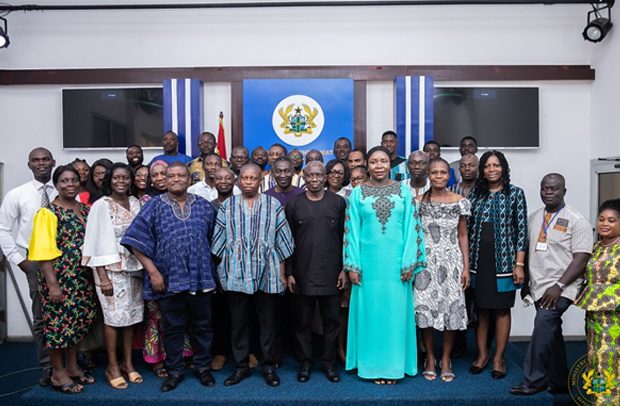Management and staff of CWSA and the Deputy Information Minister in a group photo
THE COMMUNITY Water and Sanitation Agency (CWSA), as part of its reformation programme to transform rural communities and small towns in the wash sub-sector, has deployed a SmartTap technology to improve water operation system across the country.
The technology, according to the Chief Executive Officer of CWSA, Ing. Dr. Worlonyo Kwadjo Siabi, would help improve the delivery of safe water to rural communities and small towns and promote water related sanitation as well as hygiene practice across the country.
Providing updates on the progress of the deployment thus far, at a press briefing in Accra on Sunday, the CEO said the system had been deployed in 11 regions improving water system operation and reducing congestion in access to potable drinking water.
“We have noticed that because of the numerous challenges we have and the way the world is going, we can no longer be using the manual way of water production and so we have decided to improve water supply particularly in our rural areas. So, we have deployed a number of technologies. We have what we call the SmartTap.
“With this system, we don’t need water vendors to go and sit there to wait and quarrel and when it is not coming, there are insults. The system is token-based which is free and depends on how much water you need which helps the communities to manage and plan on how much water they need,” he said.
He said the provision of potable drinking water to rural areas has improved remarkably since the implementation of the agency’s reform programme. He said prior to the reformation, only 10 per cent of its water infrastructure were functional while a larger percentage of it were broken down.
Other Programmes
On the back of this reformation, he said CWSA was currently managing 177 pipe water systems in 150 districts in the 16 regions of the country, implemented 125 water systems across the country and recruited 1,252 additional staff who were being paid by CWSA from water sales to manage these facilities.
In addition, he noted CWSA had also installed automated pumps and packaged water treatment plants, installed solar energy to reduce operational cost and deployed softwares internally to manage its operations.
Ing. Dr. Siabi noted that the reformation programme was helping to position the organisation as one of the efficient state enterprises in the country.
BY Ebenezer Amponsah

